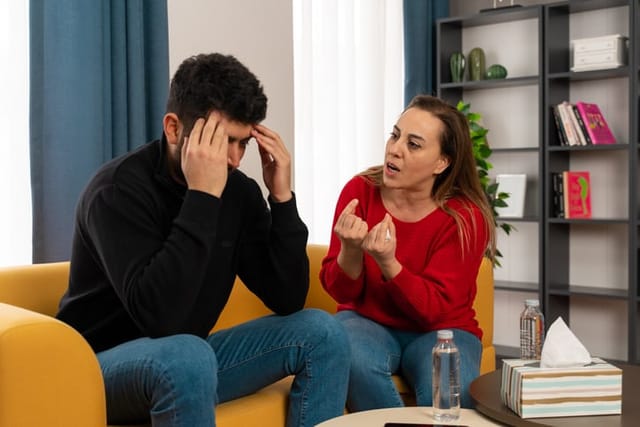When talking to someone who struggles with low self-esteem, the words you choose can have a major impact. It’s tough to be sensitive and understanding, especially when you’re getting frustrated with a situation, but it’s still important to have a bit of tact. Here are some things you should never say to a person whose confidence is on the floor.
1. “You Just Need to Be More Confident.”

Telling someone to simply “be more confident” isn’t helpful. It’s like telling someone who can’t swim to just swim faster. Confidence is built over time and through positive experiences, not through sheer will. This phrase can make them feel like it’s their fault for not being confident enough. It overlooks the deeper issues that contribute to low self-esteem and puts undue pressure on them to change quickly.
2. “You’re Being Too Sensitive.”
This phrase dismisses their feelings and experiences. It implies that the problem is with their reaction, not the situation itself. It can make them feel like their emotions are invalid or exaggerated. Sensitivity isn’t a weakness; it’s a part of who they are. Telling someone they’re too sensitive overlooks the validity of their feelings and can make them feel even more self-conscious.
3. “You’re Making a Big Deal Out of Nothing.”
This statement belittles their feelings and experiences and suggests that their struggles with self-esteem are trivial. These issues are important to them and can impact many aspects of their life. Recognizing the weight of their struggles is important if you’re going to offer any kind of meaningful support.
4. “You Shouldn’t Feel That Way.”

Telling someone they shouldn’t feel a certain way about themselves or their life is dismissive, and it invalidates their experience and emotions. Feelings aren’t right or wrong; they just are. This phrase can make them feel guilty for their feelings, adding to their self-doubt. It’s important to acknowledge their feelings and offer support, not to judge or dismiss them.
5. “Just Stop Thinking About It.”

This advice oversimplifies the complex nature of self-esteem issues. Telling someone to stop thinking about their insecurities doesn’t address the root problem. It’s not about the lack of trying, it’s all about the overwhelming nature of these thoughts. This phrase can make them feel like they’re failing at something that should be simple. Understanding and empathy are crucial in helping someone work through low self-esteem.
6. “Everyone Feels That Way Sometimes.”

While this is meant to normalize their feelings, it can often minimize their struggle. It implies that their feelings are common and not a big deal. Low self-esteem can be a deeply personal and intense experience. It’s more helpful to acknowledge their feelings as valid and unique to them. This provides comfort and understanding instead of making them feel like just another number.
7. “You Have Nothing to Be Insecure About.”

This phrase, although reassuring, can invalidate their feelings. It suggests that their insecurities are baseless. The reality of self-esteem issues is that they don’t always align with external circumstances. It’s important to recognize that their feelings are real to them, regardless of how they appear to others. Empathy and validation are important here.
8. “You’re Just Looking for Attention.”

Accusing someone of seeking attention is dismissive and hurtful. It suggests that their struggle with self-esteem is not genuine but a bid for sympathy. This can make them feel ashamed and misunderstood. The struggle with self-esteem is a real and personal battle, not a call for attention. Understanding and support are what’s needed, not judgment.
9. “Just Do Something About It.”

This phrase oversimplifies the process of overcoming low self-esteem. It’s not about just doing something; it’s about the journey of understanding and self-acceptance. Self-esteem issues are often deeply rooted and require time and effort to work through. This kind of advice can make them feel overwhelmed and inadequate for not having ‘fixed’ their problems already.
10. “It’s All in Your Head.”

While self-esteem issues are obviously psychological, saying it’s all in their head can be dismissive. It implies that their struggles are not real or significant. These issues are very real to the person experiencing them and affect their daily life. It’s important to acknowledge the reality of their struggles, not diminish them.
11. “You’re Overreacting.”

Telling someone they’re overreacting will never go over well. It can make the person feel like their emotions aren’t warranted or are too extreme. Self-esteem issues can cause intense emotions and reactions. It’s important to offer support and understanding, rather than making them feel like they’re making a big deal out of nothing.
12. “You Look Fine.”
While this might be meant as a compliment, it can come across as superficial. For someone struggling with low self-esteem, the issue often goes deeper than just appearance. This phrase can make them feel like their concerns are being brushed aside. It’s important to address their feelings, not just their appearance.
13. “Why Can’t You Just Be Happy?”

This question implies that happiness is a simple choice, which it isn’t for someone struggling with self-esteem. It overlooks the complexity of emotions and mental health. It can make them feel guilty for not being able to “just be happy.” It’s important to understand that happiness is a journey, especially for those dealing with self-esteem issues.
14. “You Just Need to Stop Being Negative.”

This advice oversimplifies the nature of negative thoughts that come along with low self-esteem. It’s not about choosing to be negative; it’s often a deep-seated pattern of thinking. Telling someone to stop being negative can make them feel like it’s their fault for not being positive. Support and understanding are what’s needed to help them shift these thought patterns.
15. “That’s Just Life.”

While this phrase is meant to normalize challenges, it can feel dismissive. It can come across as belittling their struggles. Everyone’s experience of life is different, and for someone with low self-esteem, their challenges can feel insurmountable. It’s more helpful to acknowledge their struggles and offer support.
Hope you found this helpful. Give it a like and follow Bolde on MSN for more!






